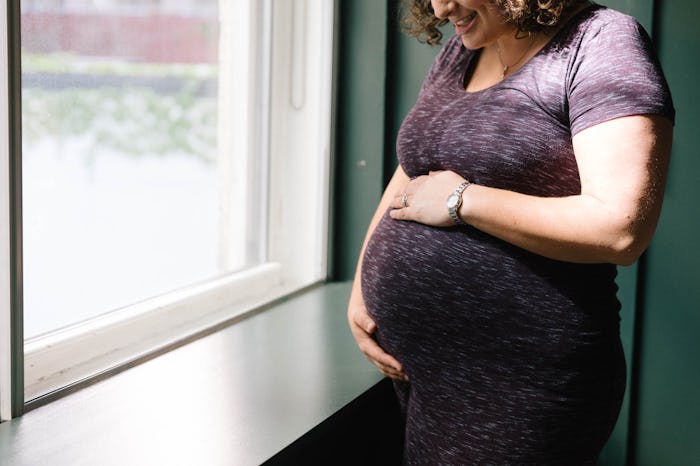Life
How Your Pregnancy Weight Gain Affects Your Baby's Size
Sometimes it feels like a pregnant belly has a sign that says "kindly send your unsolicited advice here." Whether it’s that you are carrying high or low, a rounder face means you’re having a girl, or reasons for a drug-free birth, it’s like people have never heard of the funny things pregnancy hormones can make a woman do. Or tact. The same goes for pregnancy weight gain — everyone has a theory about what the size of your belly means about a growing baby. But does your pregnancy weight gain affect your baby's size?
Dr. Christine Greves, an OB-GYN at Winnie Palmer Hospital for Women & Babies in Orlando, Florida, tells Romper in an email interview that "pregnancy weight gain can affect the size of the baby," but the pendulum swings both ways when it comes to healthy weight gain during pregnancy.
"If the mom has not gained enough weight, there can be the concern that the baby may not get enough calories to grow appropriately," she says. "For women who have gained excessive amounts of weight, that puts them at an increased risk for gestational diabetes. Gestational diabetes places the baby at an increased risk for being larger as well."
California OB-GYN Dr. G. Thomas Ruiz tells Romper in an email interview that women with a BMI of 35 or more tend to give birth to babies more than 8 pounds on a regular basis. "This is also true of women who gain more than 40 pounds during pregnancy," he says.
The reason, Ruiz explains, is that these women "have a higher circulation of insulin to control their blood sugars, which acts as a growth factor in the fetus."
If it’s time for you to up the ante in your pregnancy weight gain, then it is recommended that you eat more calories. It sounds like "duh" advice, but it’s important for women who are looking to gain weight to think about their meals in terms of many small, nutrient-packed meals throughout the day. Think healthy fats, like avocados and nuts, as well as higher-calorie grains and legumes, such as dense whole-wheat breads or whole-grain cereals and pasta.
On the other hand, if you are trying to keep your weight in check, then it’s important to discuss adequate weight goals with your doctor, double board-certified OB-GYN and Maternal Fetal Medicine specialist Dr. Kecia Gaither tells Romper in an email interview.
"Your doctor may then enlist the support of a nutritionist to provide input," Gaither says. "Certainly daily exercising, like walking or swimming are encouraged, increasing fruit and vegetable consumption, cutting out fried foods, and substituting water for sodas."
And go easy on yourself, Greves says. Sticking to a healthy diet is key, but sometimes a busy schedule gets in the way of a well-rounded meal or the baby simply needs a second piece of cake.
I mean, it’s just science.
